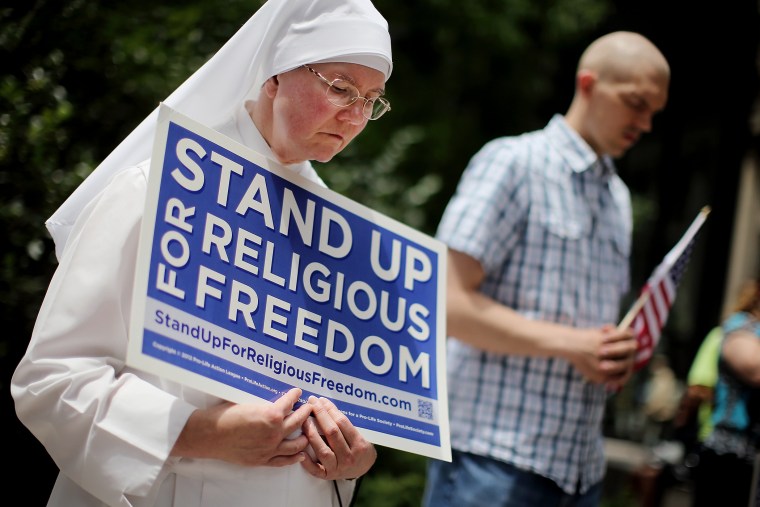Should religious organizations be permitted to engage in discriminatory hiring? Historically, the federal government’s default answer to this question has been a pretty firm “no.” Now, in the wake of Hobby Lobby, certain religious leaders are requesting that the default answer be changed to “yes.” And as with Hobby Lobby, the argument for making this change violates conservative principles.
The 1964 Civil Rights Act, enacted 50 years ago last week (with stronger Republican support in Congress than Democratic), banned discrimination in hiring. Henceforth, no hiring entity could discriminate based on race, color, sex , or national origin. In most instances it also became illegal to discriminate in hiring based on religion, but a very narrow exception was carved out for religious organizations.
Religious groups and affiliated organizations could hire and fire based on religion. But they couldn’t hire or fire anyone in a non-ministerial position based on race, color, sex, or national origin. And they weren’t allowed to use religion as a cover for these other types of discrimination. That is, they couldn’t claim that their religion forbade them to hire, for a non-ministerial position, blacks, or women, or legal immigrants from Mexico.
The rules were even stricter for a federal contractors. Anyone doing business with the federal government was forbidden to engage in employment discrimination, under a series of executive orders starting with President Franklin Roosevelt in 1941. Roosevelt, though generally loath to promote civil rights for fear of alienating powerful (and segregationist) southern Democrats in Congress, was responsive in this instance to ward off a planned civil rights march on Washington led by A. Phillip Randolph, president of the Brotherhood of Sleeping Car Porters.
"Simple: If you take the government’s money, then you have to play by the government’s rules. You don’t like those rules? Then take somebody else’s money instead."'
Roosevelt’s executive order originally applied only to racial discrimination in the defense industry, but within two years he extended it to all government contractors. Eventually the protected categories were expanded to include sex, national origin, and religion. No exception—none—was carved out for religious organizations. That meant organizations like Catholic Charities USA, which took federal money, couldn’t give preference to hiring Catholics. Somehow Catholic Charities managed nonetheless to become one of the largest and most successful charities in the country.
Why were stricter prohibitions imposed on federal contractors than on other employers? Simple: If you take the government’s money, then you have to play by the government’s rules. You don’t like those rules? Then take somebody else’s money instead.
Christendom College, a Catholic institution in Front Royal, Virginia, refuses to accept any federal subsidies because, its website says, “federal funding opens the door to massive government intrusion.” One might quibble with the adjective “massive," but otherwise that is an honest conservative argument. “When you take government money,” Wheaton College political scientist Amy Black told PBS in 2003, “there are regulations and expectations.”
When President George W. Bush established a White House Office of Faith-Based and Community Initiatives in 2001, both liberals and conservatives worried that expanding grants to religious organizations might threaten the church-state separation. Liberals worried about the Constitution; conservatives worried about those “regulations and expectations.” But most conservatives stopped fretting as it became clearer that any conflicts would typically be resolved in religion’s favor.
In 2002, Bush signed an executive order permitting faith-based contractors to choose board members based on religion, and in 2007 the Bush Justice Department issued a memo declaring that a Christian federal grantee called World Vision was free to hire only Christians, citing the same Clinton-era religious-freedom law on which Justice Samuel Alito purported to base his Hobby Lobby opinion.
Candidate Obama pledged in the 2008 presidential race that he would reverse that Justice Department ruling. “If you get a federal grant,” he said, “you can’t discriminate against … the people you hire on the basis of their religion.” Once in office, though, Obama not only maintained the Bush policy; he stood by as a religious exemption was inserted into the Senate-passed Employee Non-Discrimination Act, giving, for instance, Catholic hospitals broad latitude to fire gay nurses.
The bill has no chance of passing the Republican House, but now many religious groups are clamoring to insert the same faith-based exemption into a forthcoming executive order disallowing federal contractors to discriminate based on sexual orientation and gender identity. (Meanwhile, several gay rights groups that previously supported ENDA have changed their minds based on the religious exemption.)
Will Obama cave? Past experience on this issue suggests that he will. If he did, he’d be making a concession to a largely conservative constituency (and ignoring the separate pleading of a more liberal group of religious leaders not to grant the exemption). But the action itself—allowing religious groups to take federal money while brazenly flouting federal rules—wouldn’t be conservative at all. It would conform to the “rights revolution” caricature of 1960s liberalism that social conservatives usually complain about—take the cash, don’t sweat any societal obligations—but in a way that favors them. Don’t expect the right to complain.
